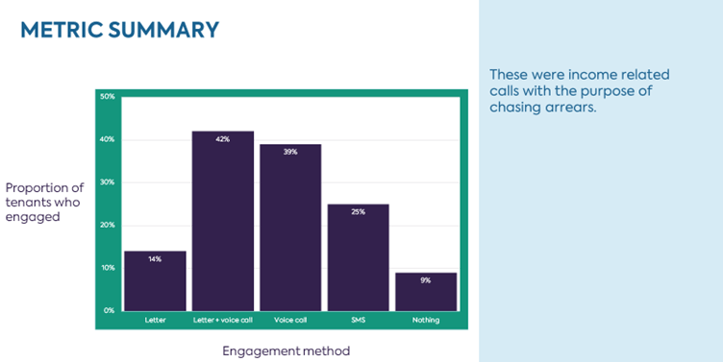
Today, we have more communication tools available to us than ever before. From letters to emails to SMS or Social Media, there’s an abundance of ways to convey information without ever having to ‘speak’ a word.
However, when it comes to managing a housing association and communicating with tenants, the power of the human voice still reigns supreme – and the evidence supports this claim. In one study, published in the Journal of Experimental Psychology, researchers concluded:
"Results suggest that the voice is a powerful tool in customer interactions and that verbal communication is more effective than nonverbal communication in producing favourable outcomes.[1]"
When you speak to someone directly, it creates a personal connection that cannot be replicated by a ‘nonverbal’ means. Tenants are more likely to feel valued and heard when they hear a human voice, and this can go a long way in building trust and rapport with them. It also allows for immediate feedback because when you send a letter, you have no way of knowing how the tenant has received the information or whether they have any questions or concerns.
Plus, when you speak to them directly, you can ask for feedback and address any concerns they may have in real-time. This helps to ensure that everyone is on the same page and that the communication is clear. It can also be more persuasive as you can use tone, inflection, and other vocal cues to convey emotion and emphasis when you speak to someone. This can be particularly helpful when you need to persuade someone to take a particular action or follow a certain procedure.
Where a letter may be informative, it is often less persuasive than a human voice. When you communicate via letter, there is always the potential for misunderstandings or misinterpretations of the information being conveyed. This can lead to further confusion and time wasted trying to clarify the situation. By speaking to tenants directly, you can ensure that they understand the information being conveyed, which can save time and reduce misunderstandings.

While the human voice has been shown to be effective in customer interactions, it may not always be practical or efficient to rely solely on this method. The use of human operators to handle customer calls can be resource-intensive, time-consuming, and costly, especially for larger organisations with a high volume of customer interactions. This is where machine learning and automation can play a significant role. By leveraging these technologies, organisations can automate routine tasks, handle simple customer queries, and provide self-service options, freeing up human agents to handle more complex and specialised tasks. With the help of machine learning and automation, organisations can streamline their customer service operations, reduce costs, and improve overall efficiency while still maintaining a human touch in their interactions with customers.
Sending letters , emails and SMS may seem like the easiest way to communicate with tenants in a housing association, but the science shows how influential the power of voice is. So next time you need to communicate with your tenants, consider picking up the phone or arranging a meeting in person – your communication will be more effective for it. If you’d like to learn more about the power of human voice and how Voicescape can help, get in touch today.
[1] Reference: Lee, Y., & Kwon, O. (2011). The role of voice in customer satisfaction: An empirical investigation. Journal of Experimental Psychology: Applied, 17(2), 79-94.





